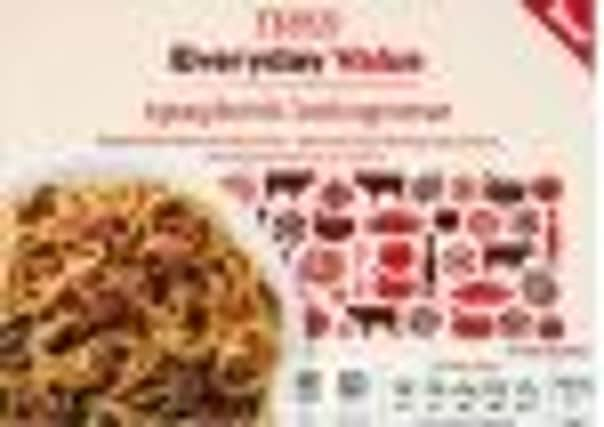Horse meat fears as retailers remove ready meals


Frozen Everyday Value Spaghetti Bolognese has been removed from sale at Tesco, while Today’s Special Frozen Beef Lasagne and Today’s Special Frozen Spaghetti Bolognese have been withdrawn by Aldi.
The move came after the food group Findus recalled its own beef lasagne as the controversy over horse meat contamination continues.
Advertisement
Hide AdAdvertisement
Hide AdFrench food supplier Comigel produces all three brands and initially asked Findus to remove its lasagne because of a “labelling issue”, after which the other chains followed.
All three firms said there was no evidence that the products had been contaminated, but they were being withdrawn for testing.
In a statement, Tesco insisted that its move was precautionary and affected only the frozen version of the product.
“Following the withdrawal of Findus Beef Lasagne, which is produced by Comigel, we have decided to withdraw our frozen Everyday Value Spaghetti Bolognese, which is produced at the same site, as a precautionary measure,” it said.
“There is no evidence that our product has been contaminated, and the meat used in the Findus product is not used in our product. However, we have decided to withdraw the product pending the results of our own tests.”
Tesco became the first major retailer to be affected by the horse meat scandal when an investigation by the Food Safety Authority of Ireland found that its value burgers contained 29 per cent horse DNA. The meat was supplied by ABP’s Silvercrest plant in Ireland. The contamination of burger products sold in the UK and Ireland has been blamed on Polish meat bought and sold by Irish meat trading company McAdam Foods.
McAdam insisted it bought the meat, labelled as beef, from Poland in good faith.
On Monday, Findus also announced that it was withdrawing its Findus Beef Lasagne from sale.
Advertisement
Hide AdAdvertisement
Hide Ad“We would like to reassure everybody that this is not a food safety issue,” it said.
The beef lasagne was the only product affected, it added, and was sourced externally rather than being manufactured by Findus itself.
Meanwhile, supermarket chain Asda has withdrawn four frozen burger products, supplied by the Northern Irish company Freeza Meats, as a precaution.
A batch of beefburgers containing 80 per cent horse DNA was discovered in a cold store at the firm’s plant in Newry. It said none of the meat had got into the food chain.
Patrick Hughes, a food and drink consultant from Scotland’s Rural University College, said the public was likely to demand far greater transparency in the wake of the horse meat scandal.
He said: “There needs to be transparency throughout the supply chain and I think people need to be aware of what’s actually going in their food. There’s also a responsibility on the retailers and producers to now demonstrate what’s in their foods.”
Ed Bedington, editor of the Meat Trades Journal, said the Food Standards Agency needs to make reforms, but highlighted the fact that it has only ever been tasked with examining carcases, and not processed meat.
He told The Scotsman: “The FSA needs to reform because they primarily examine carcases for lesions in the lung, for example, which was an issue 100 years ago, instead of E coli. But, regardless, they have never been tasked with looking for content.
Advertisement
Hide AdAdvertisement
Hide Ad“The biggest shake-up will be how the market reacts. Tesco, for example, will already be doing their own quality analysis but it’s probably just for bacteria, for example, and not content.
“I don’t know whether you can regulate for this. There is talk of DNA testing, which is one solution, but this might be more expensive than they think.
“Unless there is a further source, the origin will be narrowed down fairly quickly. Then we’ll get to why did it happen and how to stop it happening again, which, as with all these things, will take a long time indeed.”